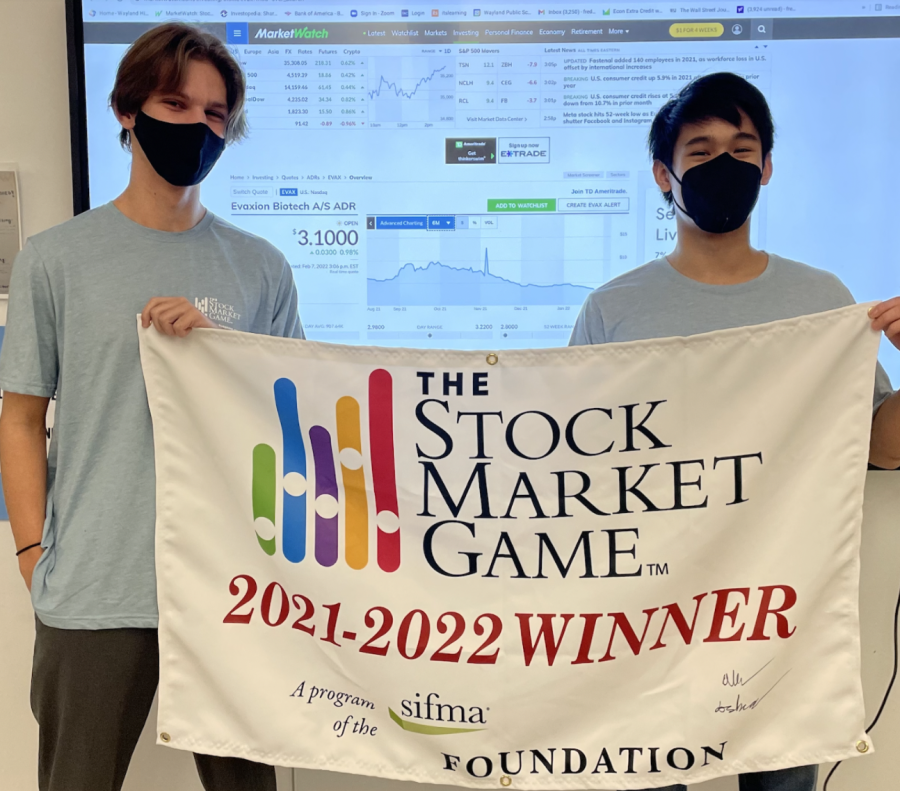Juniors Alexei Rjanikov and Josh Liu win first place in statewide Stock Market Game
Credit: Courtesy of Fred Lehman
Juniors Alexei Rjanikov (left) and Josh Liu (right) hold up the banner they received for winning first place SIFMA’s annual Stock Market Game. The duo competed in the tournament as Siligroup Banking and ended the tournament in over $240,000 in equity. “I learned how the market moves, and how to look at that and how to essentially play the game,” Liu said.
April 13, 2022
Juniors Alexei Rjanikov and Josh Liu took home first prize in SIFMA’s annual stock market game in December, finishing their run with a return of over 200% at $242,577 in cash. The pair is the first team to win from Wayland High School since 2013 and the first students of Fred Lehman, who now runs the Investing and the Creative Economy (ICE) class, to win.
Securities Industry and Financial Markets Association (SIFMA) hosts the simulation for ten weeks in the fall into the winter, starting in September and ending in December. The organization provides students to log onto a platform that conveys the stock market in real time, allowing students to simulate investing in real companies at their actual stock prices. Each team, which was composed of one to three team members, started the game with $100,000.
Teams could join on a rolling basis throughout the ten week period, but Alexei and Josh started the competition from the get go in September, joining as the team “Siligroup Banking.”
Rjanikov said he knew he wanted the name to be a parody of one of the major banks, so he narrowed down the list of potential banks by looking for the best source material. He eventually settled on City Bank Group.
Although Rjanikov and Liu joined the competition through the ICE class, they said competing in the game felt detached from the class because it wasn’t part of the class’s curriculum. The vast majority of the work they put into the competition happened outside of class time, and they developed their own investing strategies as the game went on.
When they began, their goal was simply to take their $100,000 and make it multiply. Liu and Rjanikov competed against 1,100 other teams, beating second place by over $30,000.
“We crushed them,” Rjanikov said with a smile.
But it didn’t start out that way. At first, the pair went in with a plan to make careful researched investments that would offer them returns in the long run. They said the strategy tanked them. They sank through the ranking board, and after about two weeks of employing the strategy Rjanikov said “you’re supposed to use,” Siligroup Banking found themselves in dead last. At that point, they made a change. Disheartened, Rjanikov took a step back and Liu stepped forward and turned their investing approach around.
He watched the market to find patterns that might clue him in to profitable investments and noticed that stock prices would hit a high price toward the end of the week, and by Monday—the market is closed over the weekend, so trades can’t be made—the price of the same stock would drop.
So he began shorting. Shorting stock, which is considered highly risky, is when an investor, or in this case a short seller, borrows shares of stock from a broker when the stock’s price is high, sells the borrowed stock and then waits for the stock price to drop before buying it back and returning the shares to the broker. The short seller then pockets the difference in price. If all doesn’t go according to plan, however, and the price of the stock creeps up after it’s shorted, the short seller could face ruin.
“If that stock starts going up, and it doesn’t stop, you have to pay those shares back,” Liu said. “Every trade we did, we could have lost all of our money.”
Think the infamous Gamestop short squeeze: hedge funds like Melvin Capital Management bet that the price of Gamestop stock would continue to drop, so they shorted it. When Gamestop stock skyrocketed, however, those companies were on the hook for buying back the stock at the new, exponentially higher prices. Melvin Capital alone lost 6.8 billion.
Liu was careful about the stock he chose to short, and he stuck to his strategy of buying at the end of the week and selling at the beginning. The best stock for shorting was stock that was highly volatile.
“We only had ten weeks to make this money, so we wanted stock that was moving around a lot all the time,” Liu said.
The companies that met that criteria were more often than not “no name” pharmaceutical companies, Rjanikov said.
Liu used a website that let him day trade, and often he was buying stock at 11 a.m. and selling it by noon.
“My stress was through the roof,” Liu said. “I had my computer open in class, I was constantly refreshing pages, seeing if anything had changed. I had trades all ready, typed up ready to go, so I could just click the button as soon as I saw the prices on it. That was a very emotionally taxing ten weeks and i slept for a while after it was over.”
Siligroup Banking made the majority of their profit in a two week period when the market was particularly volatile and their shorting strategy earned them big gains. Liu said that the team that came in second—the team the beat by $30,000—had made over a hundred grand in a successful early move that catapulted them to first place, after which the team virtually dropped out.
Liu said the most stressful part of the competition was catching up and then overcoming this team, but after that two week period, they were essentially on par and were able to coast for the rest of the tournament.
“I learned how the market moves, and how to look at that and how to essentially play the game,” Liu said. “This is something in the future I’m definitely going to pursue—I’m very interested in investing.”
Rjanikov, on the other hand, while he said he had fun, found the experience to be somewhat eye opening.
“Honestly, it’s kind of eroded my faith in the economic systems of America a bit,” Rjanikov said. “Because when we were playing it like we were supposed to, investing in something based on its value, we were losing money most of the time. Then when we started going ham and buying stock whenever we felt like it, we made a 200% increase.”
While that 200% increase in funds was only simulated, Rjanikov and Liu did come home with a $25 dollar gift card.
“Felt like kind of a scam,” Liu said, laughing about their prize winnings.
“Sunglasses,” Rjanikov added. “They gave us sunglasses.”
“Yeah, they gave us a bunch of merch,” Liu conceded. “That was fun.”
Siligroup Banking also has a banner in the ICE classroom that says ‘Stock Market Winners.’ Both Rjanikov and Liu said that was their favorite part, in addition to the thrill of the game, of course.
“I was joking with our friends about being dead last, and I was like, just you guys wait, we’re gonna win it all in the end,” Liu said. “And we did.”





![Last Wednesday, the Wayland School Committee gathered to discuss a number of topics regarding the health curriculum and Innovation Career Pathway course. Another large topic of conversation was the ways to potentially mitigate distracting cell phone usage. "These [phones] are going to distract your learning and social relationships," Superintendent David Fleishman said. "That's concrete right there."](https://waylandstudentpress.com/wp-content/uploads/2025/06/Screenshot-2025-06-04-at-9.49.31 PM-1200x886.png)



























![Troy Hoyt finishes the Boston Marathon, running for the Hoyt Foundation. T. Hoyt is the son of Hoyt Foundation CEO Russ Hoyt.
“[Running a marathon] might seem like a big thing, when it’s presented to you at first, but if you break it up and just keep telling yourself, “Yes, you can,” you can start chipping away at it. And before you know it, you’ll be running the whole 26 miles, and you won’t even think twice about it.” T. Hoyt said.](https://waylandstudentpress.com/wp-content/uploads/2025/04/C36E8761-1CBB-452E-9DF2-543EF7B1095E_1_105_c.jpeg)













































